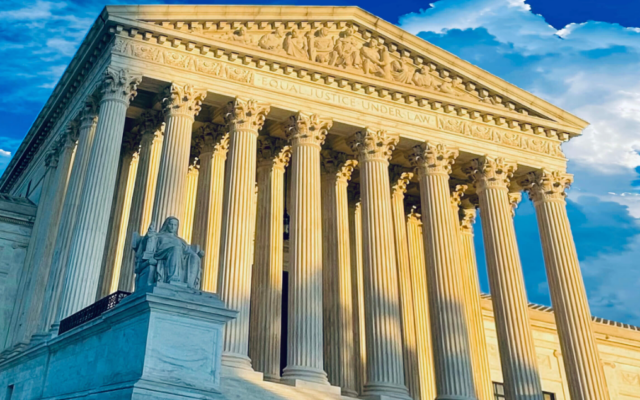Ruling on Affirmative Action Draws Local Reactions
Affirmative action programs, particularly in higher education, have been an issue that Jewish community leaders have wrestled with for decades.
The recent Supreme Court decision that struck down affirmative action in admissions programs in higher education was generally criticized by national Jewish organizations that have taken an interest in the case.
The Anti-Defamation League three years ago filed a brief in federal appeals court supporting Harvard University’s decision to make race an issue in admissions. It argued at the time that Harvard had a compelling interest in having a racially diverse student body and that race was just one factor among many that the university used.
When the 6-3 decision was announced on June 29, the ADL’s chief counsel Steve Freeman was quick to express what he indicated was the organization’s “deep disappointment.”
“This decision,” Freeman said, “reflects a fundamental misunderstanding of the history and present realities of racial discrimination in this country and the reasons why affirmative action is still needed.”
The National Council of Jewish Women, which had also filed a brief in the case which supported affirmative action, was equally dissatisfied. The chief policy officer of the organization, Jody Rabhan, calls affirmative action a “critical tool” for gaining racial equality.
“The decisions in these cases are a disturbing step backward on the road to true racial equality and equity — the guiding star NCJW advocates will continue to fight for in state houses and in Congress.”

In Atlanta, Sherry Frank, who serves as co-president of the local NCJW chapter, saw the decision as part of a wider pattern of what she felt were troubling developments.
“I think racial justice has been set back in a lot of fronts, but particularly damaging in education. I mean, when you see the kind of ban on books, when you see the curtailing of discussion of our true history, you know, the impact is pretty devastating, and it affects all of us.”
Frank, who was instrumental in the founding of Atlanta’s Black Jewish Coalition, has worked for years to improve the relationship between the Jewish community and African Americans. In the last several decades of the 20th century, affirmative action was seen as a bedrock issue in the minority community. In the African American community of the 1970s and 1980s, the issue was as important to many Black political leaders as support for Israel was for prominent Jews.
I think racial justice has been set back in a lot of fronts, but particularly damaging in education. I mean, when you see the kind of ban on books, when you see the curtailing of discussion of our true history, you know, the impact is pretty devastating, and it affects all of us.
When she was the American Jewish Committee representative in Atlanta, Frank became keenly aware of how important the issue was for both communities.
“Many Jews, particularly more progressive Jews, understood the importance of making the playing field more equal and moved towards supporting affirmative action. I can tell you when I was at the American Jewish Committee, and I would get a call from Andrew Young or Maynard Jackson to speak out on affirmative action, I did.”
However, Rabbi Shalom Lewis, the Rabbi Emeritus of Congregation Etz Chaim, the conservative synagogue in East Cobb, sees the Supreme Court decision as correct. Affirmative action, he believes, is a program of the past.

“I think there will be those that will claim that it is a return to bigotry. I don’t see it that way. What the Supreme Court did was a reassertion that people of color have made great strides in this country, from the presidency to mayors to personalities in business to the police departments, even. America today is not the America of years ago when affirmative action perhaps served a purpose.”
Prominent Jewish organizations, too, have not always been supporters of affirmative action. Fifty years ago, Allan Bakke, a NASA engineer, was twice rejected by the University of California Medical School over a quota program that reserved 16 percent of the incoming class for disadvantaged minorities. He sued.

The case went to the Supreme Court and the three major Jewish organizations at the time, the ADL, the American Jewish Congress, and the American Jewish Committee, all filed briefs in support of Bakke. He won.
Reform Judaism was also opposed to a numbers system. In 1977, the URJ passed a resolution stating that equal opportunity was “morally obligatory.” But it rejected quotas in favor of such tools as goals and timetables.
In response to last month’s Supreme Court decision, Rabbi Brad Levenberg at Temple Sinai, a Reform synagogue in Sandy Springs, maintained some of the ambivalence that the Reform movement expressed so many years ago.
“Our communities still are far from equitable,” Rabbi Levenberg commented, “and racial divides remain remarkably problematic when considered through the lens of opportunity. While affirmative action was never ideal, it was a better solution than doing nothing.”
- News
- Local
- Bob Bahr
- Supreme Court
- affirmative action
- Higher Education
- Anti-Defamation League
- Harvard University
- Steve Freeman
- National Council of Jewish Women
- Jody Rabhan
- Sherry Frank
- Black-Jewish Coalition
- American Jewish Committee
- Andrew Young
- Maynard Jackson
- Rabbi Shalom Lewis
- congregation etz chaim
- Allan Bakke
- University of California Medical School
- American Jewish Congress
- Rabbi Brad Levenberg




comments